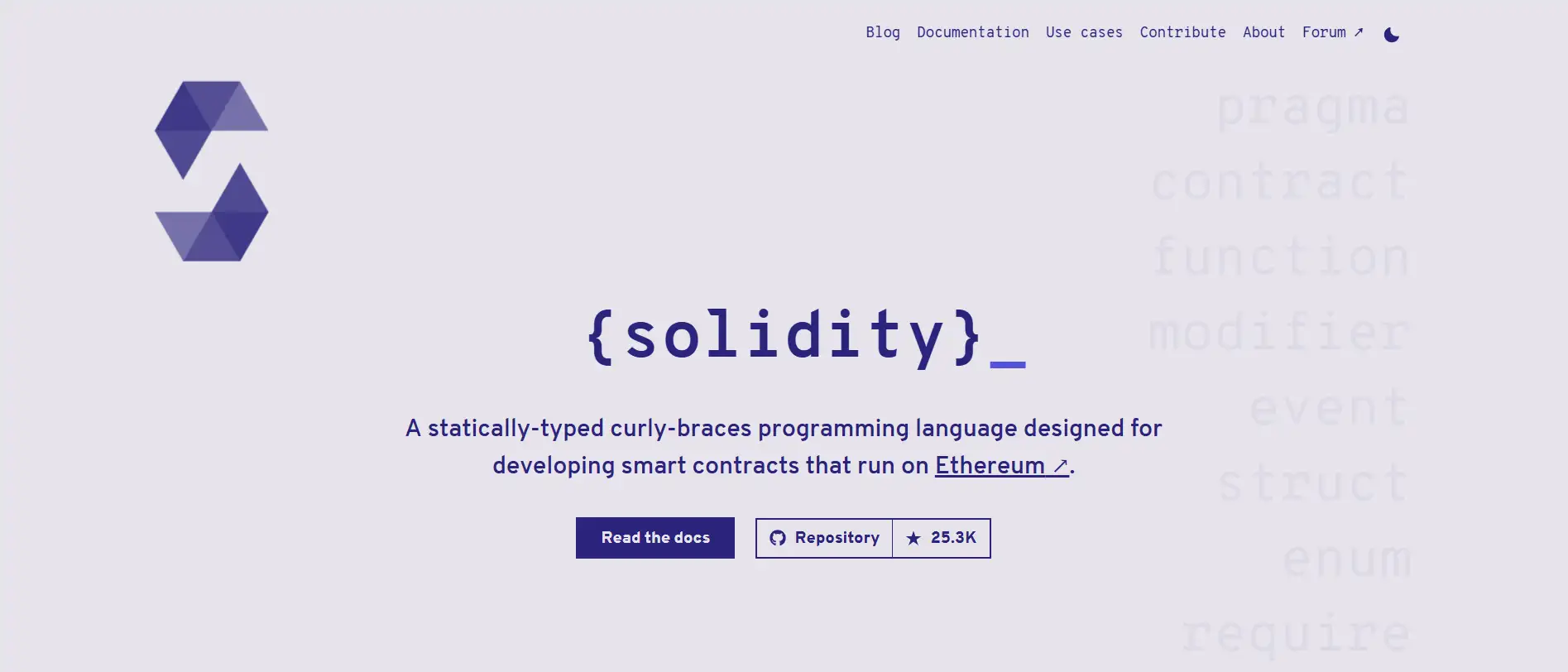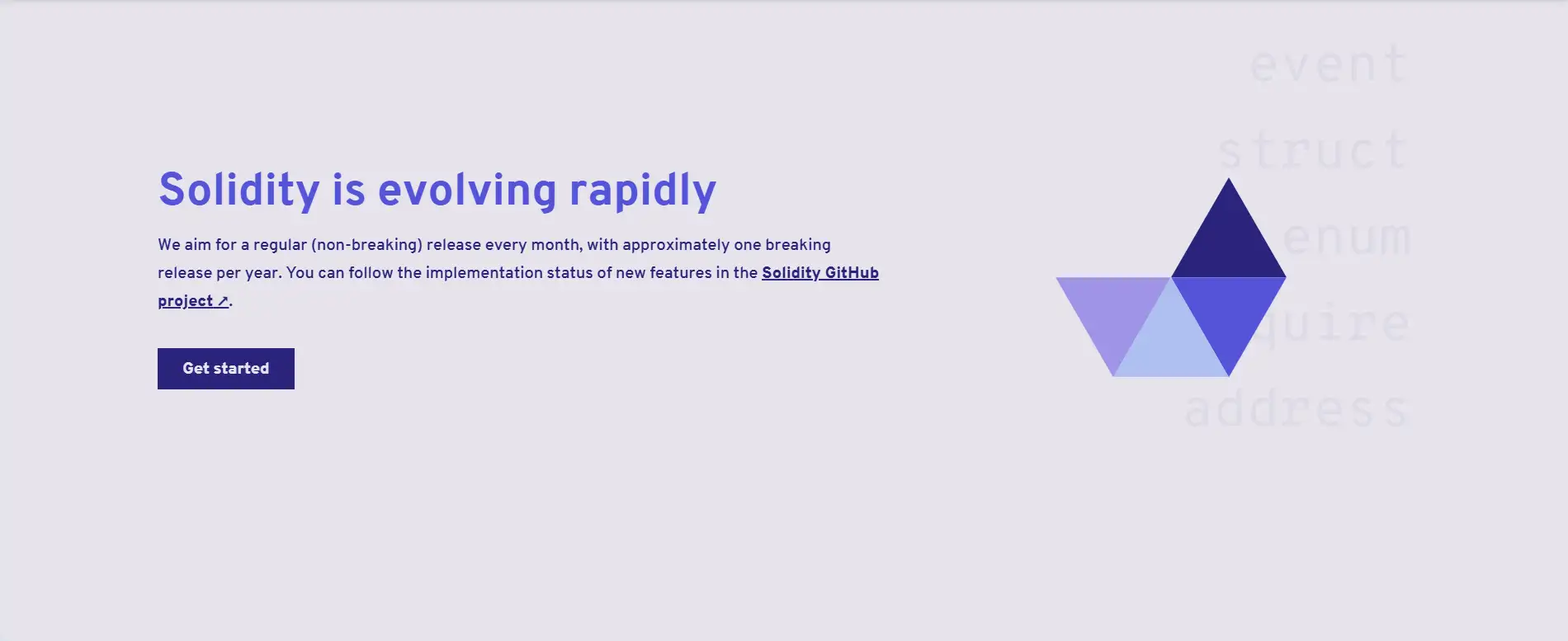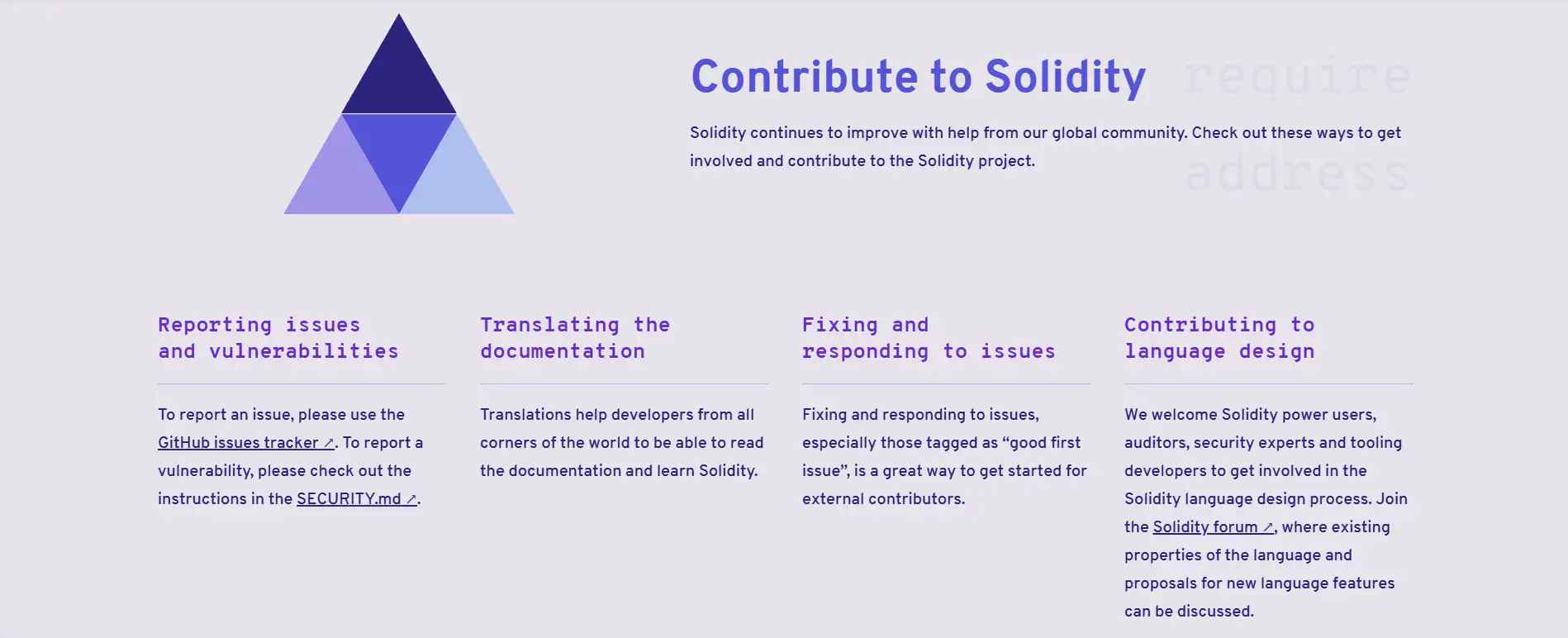About Solidity
Solidity is the primary programming language for writing smart contracts on the Ethereum Virtual Machine (EVM). Designed with a syntax similar to JavaScript and C++, it enables developers to create decentralized applications (dApps) that run autonomously on the blockchain. Solidity is statically typed, contract-oriented, and tailored for high-performance, secure logic execution in distributed environments.
Developed initially under the Ethereum Foundation and now maintained by the Argot Collective, Solidity has evolved into a mature and widely adopted language used by DeFi protocols, DAOs, NFT platforms, and enterprise blockchain systems. With active community governance, frequent updates, and strong ecosystem support, Solidity remains essential to Ethereum and EVM-compatible development.
Solidity was first previewed at Devcon0 in 2014 and has since become the de facto standard for smart contract development on Ethereum. The language allows developers to define the behavior of contracts that facilitate value transfer, enforce ownership, enable decentralized governance, and much more—without requiring centralized intermediaries. Since its versioning began in 2015, Solidity has seen consistent improvements, with version v0.8.30 being the most recent as of May 2025.
Solidity is specifically designed for the unique requirements of blockchain applications: deterministic execution, gas optimization, on-chain storage, and upgradability. Its robust type system includes structures such as structs, enums, modifiers, and events, making it ideal for modeling complex logic in a transparent, immutable way. The language also supports inheritance, interface definitions, and low-level assembly code for advanced use cases.
The Solidity ecosystem is supported by a growing community of developers, auditors, educators, and contributors. It features an active Solidity Forum, a GitHub repository with over 25,000 stars, and ongoing language design discussions through surveys and events. Notable initiatives include the Solidity Summit, the Underhanded Solidity Contest, and regular public roadmap updates via the official blog.
The language continues to evolve rapidly, with monthly non-breaking releases and an annual breaking release cadence. Developers are encouraged to always use the latest compiler version to benefit from performance optimizations, new features, and bug fixes. Integration with tools like Remix, Hardhat, and Foundry further supports rapid development, testing, and deployment of Solidity-based contracts.
While competitors like Vyper, and Sway are gaining traction, especially on non-EVM chains, Solidity remains the most widely used and battle-tested language for Ethereum-compatible development. It powers billions of dollars in value across DeFi, NFTs, DAOs, and L2 scaling solutions.
Solidity offers a wide range of features and advantages that make it the go-to language for Ethereum and EVM-based development:
- Battle-Tested on Ethereum: Solidity has powered major DeFi protocols, DAO frameworks, and NFT platforms across the Ethereum mainnet and L2s.
- Statically Typed and Contract-Oriented: Solidity offers built-in constructs like contracts, interfaces, and libraries tailored for blockchain development.
- Optimized for Gas Efficiency: Includes compiler optimizations and advanced patterns to minimize execution costs on-chain.
- Interoperability: Seamlessly deploys on EVM-compatible chains like BNB Chain, Polygon, Avalanche, and Arbitrum.
- Rich Ecosystem: Integrated with tools like Remix, Hardhat, Truffle, and Foundry for full-stack dApp development.
- Security Best Practices: Includes built-in error handling with require(), assert(), and a community-driven focus on formal verification and audits.
- Open Source and Community-Governed: Developed transparently via the GitHub repository and language forum.
- Global Community Support: Thousands of developers, frequent events, summits, and extensive documentation to support learning and growth.
You can start building smart contracts with Solidity today by following these simple steps:
- Visit the Website: Go to soliditylang.org for official documentation, news, and development resources.
- Use the Playground: Test Solidity code directly in your browser using the integrated Solidity Playground or a full IDE like Remix.
- Read the Documentation: Explore detailed guides and syntax references under the Docs section, covering everything from beginner to advanced topics.
- Install the Compiler: Set up the Solidity compiler locally using npm, Docker, or from source to compile and deploy contracts.
- Join the Community: Engage in language design discussions via the Solidity Forum or follow updates on Twitter, GitHub, or Matrix.
- Contribute: Help improve Solidity by submitting issues, translating docs, or contributing to the open-source repository.
- Stay Updated: Follow the Solidity Blog for release announcements, roadmap updates, and language insights.
Solidity FAQ
Solidity is designed specifically for writing smart contracts that run on the Ethereum Virtual Machine (EVM), whereas languages like JavaScript or Python are general-purpose. In Solidity, all code execution is deterministic, and contract logic must account for gas usage, immutability, and blockchain-specific behaviors. Solidity also includes built-in types like address, mapping, and event, which are tailored for blockchain interactions. You can learn more about Solidity's unique architecture on the official site at soliditylang.org.
Solidity follows a structured release cycle with monthly non-breaking updates and approximately one breaking release per year. Developers are encouraged to use pragma directives to lock their contract to specific versions, reducing the risk of future incompatibility. The latest compiler version is v0.8.30, released in May 2025. Always refer to the Solidity Blog for update announcements and best practices.
Yes, Solidity is supported by many EVM-compatible blockchains including Polygon, BNB Chain, Avalanche, Arbitrum, and Optimism. This allows Solidity developers to deploy applications across different ecosystems without rewriting their code from scratch. The portability of Solidity contributes to its widespread adoption across Web3 platforms.
Solidity includes several security-focused features such as require() and assert() for input validation, custom errors for efficient reverts, and visibility modifiers like public, private, and internal. It also supports SafeMath operations by default as of v0.8.0, preventing overflows and underflows. Developers are encouraged to follow secure coding patterns and use tools like Remix and static analyzers to detect vulnerabilities before deployment.
You can use the Solidity Playground for simple code experiments. For a full-featured browser-based IDE, Remix is the go-to platform for compiling, deploying, and debugging contracts. It runs entirely in the browser and supports injected Web3 environments like MetaMask. Visit Remix IDE to get started instantly.
You Might Also Like












